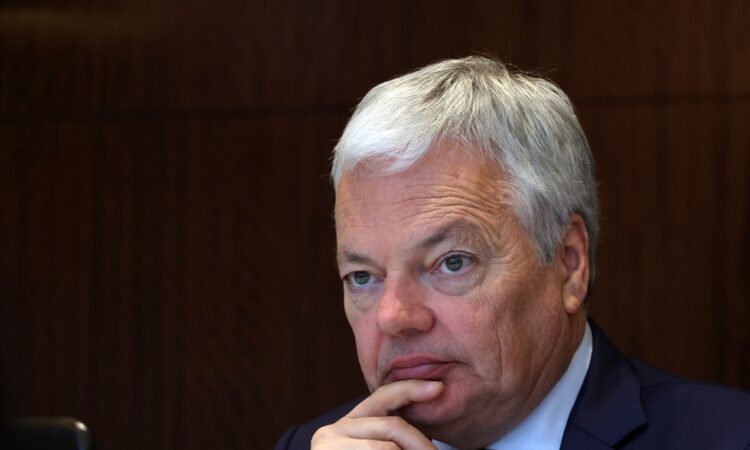
[INTERVIEW] EU hopes to enhance collaboration with Korea on digital economy
| European Commissioner for Justice Didier Reynders speaks during an interview with The Korea Times at a hotel in Seoul, Wednesday. Yonhap |
By Kwon Mee-yoo
The European Union seeks to enhance cooperation with Korea in the fields of data flows, data protection and sustainable corporate governance, as the digital economy is growing in importance due to the increasing reliance on technology in every aspect of life.
European Commissioner for Justice Didier Reynders visited Korea from April 11 to 12, participating in meetings with Korea’s justice and trade ministers as well as heads of the Personal Information Protection Commission, the National Human Rights Commission of Korea and the Korea Consumer Agency.
The justice commissioner, who led negotiations for the EU’s adequacy decision on transferring personal data to Korea under the EU General Data Protection Regulation in December 2021, hopes to strengthen digital ties between the EU and Korea, including two-way data flows and expansion to cover financial data.
The adequacy decision determines whether a non-EU country has sufficient data protection for personal data to be sent from the EU without additional safeguards.
“We have an important data flow between EU and Korea due to the adequacy decision that was made in 2021,” Reynders said during an interview with The Korea Times at a hotel in Seoul, Wednesday.
“So I’ve discussed with the data protection authority here about the possible evolution of such a situation, because due to the last reform of the data protection authority, it will be maybe possible to have a material adequacy arrangement for a data flow not only from Europe to Korea, but also from Korea to Europe.”
The justice commissioner said Korea’s data protection level is comparable to the EU’s General Data Protection Regulation (GDPR) and expressed his interest in expanding the adequacy decision to include financial services, which are governed in Korea by a separate regulatory body.
The EU has introduced new legislation such as the Digital Services Act, the Digital Market Act and regulations on artificial intelligence (AI) to impose obligations on online platforms and protect personal data under the GDPR.
“The GDPR is the cornerstone of the protection, and in relations with partners like Korea, it is very important to continue to protect the personal data like we do with the adequacy decision,” he said.
“I have expressed the request if it’s possible to have an evolution and to take the financial services on board, but that needs the transfer of competence to the data protection authority.”
| European Commissioner for Justice Didier Reynders speaks during a seminar on the European Union’s due diligence directive at the National Assembly in Seoul, Wednesday. Yonhap |
AI is another area covered by the GDPR, and Reynders said the EU takes a human-centric approach toward new technologies including AI and promote innovation without limiting it. However, they also prioritize analyzing and certifying high-risk applications before putting them on the market.
“And on top of that, we will try also to organize the civil liability about possible use of products including AI,” he said, giving an example of where the liability would be in case of a traffic accident involving an autonomous driving car without a driver.
“The only one saying that we are sure the liability will not be in the hands of the driver because we don’t have a driver in such car,” he said.
“We are hoping to work with partners like Korea to see how it’s possible to formulate global norms and standards that promote safe and trustworthy AI. That is the final goal to have, if it’s possible, common approaches at the international level.”
The commissioner also took part in a seminar at the National Assembly to share the EU’s directive on corporate sustainability due diligence with Korean lawmakers and businesspeople as it would impact Korean companies active in Europe.
The directive aims to regulate companies and their supply chains to prevent harm to the environment and human rights violations
“We want to be sure that in the entire supply chain, there is no risk for the environment and for the human rights,” he said. “So we try to fight against harm to the environment and fight against violations of human rights like child labor or forced labor.”
The EU official said that cooperation between the EU and Korea is feasible on this issue because Korea’s National Assembly is also developing a comparable bill and the EU is open to discussions with Korean stakeholders.
“We will continue to exchange with the Korean authorities and businesses in Korea to explain what is needed,” he said.
Reynders also raised the topic of Russia’s invasion of Ukraine ahead of the Korea-EU summit slated for May 22, emphasizing that the EU is providing military, financial and micro financial assistance to Ukraine and will endeavor to bring the perpetrators of war crimes to justice.
“We are very pleased to see that it was possible for Korea to apply different sanctions against Russia due to the aggression of Russia against Ukraine,” the justice commissioner said.
“What we want to achieve is to be sure that there is no circumvention of the sanctions and so we count on different partners like Korea to be very strict about possible attempts to circumvent or bypass the sanctions.”
He added that the EU is also looking to reconstruct Ukraine and hopes that Korea will participate in the process.






